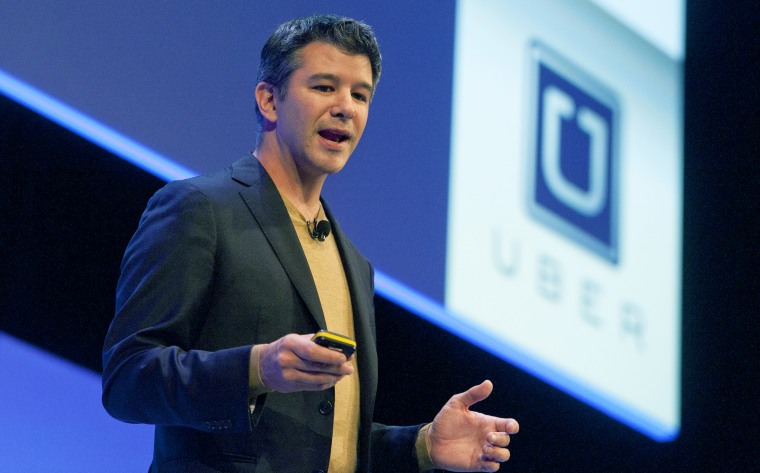It's been a rough few days for Uber, which started the week by announcing it would fire the one-time head of its ambitious autonomous vehicle program. Then, on Thursday, Uber revealed its chief financial officer had quit and that the company had sustained quarterly losses of $708 million.
The trifecta could come shortly: Next week, Uber is set to release to the public the results of an exhaustive internal inquiry carried out by former U.S. Attorney General Eric Holder. That probe was touched off when a former company engineer went public with complaints about sex harassment and other challenges faced by Uber’s female employees.
While well-funded, the company continues to burn through cash at a fierce rate. The big first quarter loss certainly is a strain for the ride-sharing company, which has been operating deep in the red. But the company pointed out that the numbers were less than the $991 million deficit rung up during the final three months of 2016.
“The narrowing of our losses in the first quarter puts us on a good trajectory towards profitability,” Uber said, adding that its revenue for the latest quarter rose 18 percent, to $3.4 billion.
Going Driverless Means Fewer People to Pay
Uber has been investing heavily in its future, but nowhere is the financial drain more severe than on the driver’s side. The vast bulk of its costs go to paying all those independent contractors who are summoned whenever a customer uses the Uber smartphone app. And trying to eliminate that ledger entry is what may have gotten the company in trouble with Waymo.
Just four years ago, Anthony Levandowski was a star. At 33, he was leading Google’s self-driving car program, considered the leading prospect to transform a technology long seen as science fiction into everyday reality. But in January 2016, Levandowski tendered his resignation and formed a company named Otto that focused on developing autonomous trucks.
That company made headlines when, last October, it provided a self-driving truck to Anheuser-Busch to transport a load of freshly brewed beer on a 120-mile trek through Colorado. By then, Otto had been purchased by Uber and Levandowski was running Uber’s autonomous vehicle program.
Actually, Uber doesn’t just want to have a car that can handle driving duties but still require an “operator” to ride as backup in case of an emergency. It is looking to eliminate the driver entirely, with CEO Travis Kalanick repeatedly promising that the cost of a ride in fully driverless vehicles would fall so sharply that millions of Americans would likely sell their cars and rely solely on ride-sharing services.
Several recent studies have given that boast credence. A forecast issued in May by tech consultancy RethinkX predicted that 95 percent of all the miles Americans travel on roadways will be in driverless, electric ride-share vehicles.
Add the fact that both Levandowski and Kalanick share similarly intense personalities and it’s no surprise the Uber CEO notably said of the autonomous engineer, “I feel like we’re brothers from another mother.”
Corporate Culture Under Scrutiny
It seems like another personality trait they might share is the ability to get into some deep trouble. Kalanick has been a frequent target of criticism in recent months for creating a “baller,” or highly macho, culture at Uber. He was caught on video raging at an Uber driver who had complained about his payouts.
That led Kalanick to announce he would seek a new chief operating officer. That news came as a surprise to Uber’s then-new president, who promptly quit. There has been, in fact, an exodus of talent from the still privately held company. On Thursday, Uber revealed its chief financial officer Gautam Gupta, would be replaced.
It’s unclear if that was a voluntary departure, but the ouster of Levandowski certainly wasn’t. It came after U.S. District Judge William Alsup openly faulted Uber for “keep(ing) on your payroll someone who took 14,000 documents and is liable to use them."
IP, or intellectual property, lawsuits are common in hyper-competitive Silicon Valley, but observers call the Waym-Uber case particularly bitter. For the self-driving car company, the stakes are potentially huge. A loss:
- Could force the company to shut down its autonomous vehicle program,
- Result in having to restart key elements of its research effort; or
- Uber might be forced to pay a substantial fine or licensing fees to Waymo.
For its part, Uber contends that even if Levandowski did steal Waymo documents, it hasn’t used any of that to speed up its own autonomous vehicle development efforts.
The reluctant decision to fire Levandowski is being viewed as a step to placate the court and prove the one-time Google engineer is not critical to the Uber program.
For his part, Levandowski faces plenty of his own legal problems. Among other things, Judge Alsup recently referred the case to the Justice Department to see if there may have been criminal wrongdoing.
It’s not clear how much longer the case will drag out. But Uber’s problems just seem to mount. Another hurdle will come one former Attorney General Holder releases his report on alleged sexual harassment and discrimination within the ride-sharing service.
If it backs up the complaints lodged by former engineer Susan Fowler Rigetti it could leave Uber open to more legal problems. And it could also reawaken the #DeleteUber boycott launched earlier in the year that reportedly led to a number of the services users dropping the service.
Ultimately, Uber will have to pay for its many problems and alleged transgressions. It can’t afford to be losing customers now.
